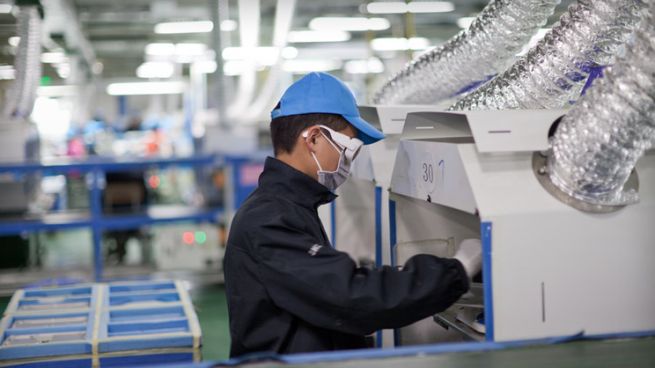A missed opportunity: how UK companies can tap into China's tech boom
Advice from China's Foreign Trade Centre

When China's e-commerce giant Alibaba announced its impending IPO earlier this year, one particular fact proved particularly popular in illustrating the scale and prosperity of the firm. Namely, that its sales figures were tens of billions of dollars more than US powerhouses Amazon and EBay combined.
The statistics aptly demonstrate the level of profit that can be mined from the Chinese technology market, which makes it somewhat baffling that the UK's share of exports to the Asian superpower is quite so small.
Explaining the issue in our Q&A, and suggesting what British companies can do to increase trade with China, is Xu Bing, Deputy Director General of China Foreign Trade Centre.
TechRadar Pro: What are the main business opportunities for UK tech companies in China?
Xu Bing: UK businesses are not taking advantage of China's rapid economic growth. The UK's share of exports to the Chinese market has fallen to around one per cent over the past decade, raising concerns that Great Britain is not aligning its trade offerings with China's fastest growing sectors.
China boasts the world's largest ICT market, with over 600 million mobile users and more than 400 million Internet users. With this in mind, areas where UK tech businesses could profit is delivering more service based offerings around communication and IT.
TRP: What technology-related products and services should UK businesses be looking out for in China?
Are you a pro? Subscribe to our newsletter
Sign up to the TechRadar Pro newsletter to get all the top news, opinion, features and guidance your business needs to succeed!
XB: China's consumer gadget appetite is driving government investment in technology and innovation. The country has long been a factory floor for popular consumer tech gadgets, and China's homegrown companies are challenging leading global brands and setting trends in telecommunications, mobile devices and online services.
UK businesses would be wise to look out for small tech startups that offer the latest consumer technology, whether that is the latest mobile device accessories or online apps. Also, do not ignore those large Chinese companies that have now out-grown their home market and want to expand globally.
TRP: Are there any possibilities for collaboration between Chinese and British startups?
XB: Yes, there are great opportunities for young UK businesses to collaborate with Chinese startups.
Taking a strategic approach to partnering with a Chinese business must be taken though. For example, make sure you fully understand the market and whether it compliments your business goals and objectives. Conduct reliable research before venturing into any partnership, ask for advise, and make sure you understand the regional differences in the country.
China should not be regarded as a single market as it is made up of over 30 different provinces and municipalities.
TRP: How are China's intellectual property protection laws being enforced with regard to protecting copyright, patents, designs, and trademarks?
XB: This has been the cause of many UK businesses being reluctant to invest in China. In the late 1970s, China had no intellectual property (IP) protection laws in place, but now the country has implemented strong IP regulations that challenges those in other countries.
Many UK businesses have also questioned China's IP protection law enforcement, but substantial progress has been made, partly driven by the rise of home grown intellectual property rights (IPR) developed and owned by Chinese companies themselves.
The Canton Fair [Chinese trade show has been a leader of IPR protection in China's exhibition industry, and has established an IPR Complaint Office at the show. Any buyer, who suspects an exhibitor has infringed upon his IPR, trademark or patent, can seek advise at the IPR Complaint Office to resolve the matter. The complaint office offers expertise and lawyer assistance, and can help with trade disputes as well.
In China, the first person to register a trademark or logo is the legal owner. For any company looking to enter the Chinese market, make sure you are the first to register your brand before engaging in any activity. This will hopefully guarantee the trademark or logo stays safe.
UK companies should still seek advise from local Chinese authorities when entering the market to protect the business products or services.
TRP: Are there any hubs or trade bodies that could help UK firms looking to do business in China?
The place to start would be contacting the Chinese Britain Business Council (CBBC), an organisation created to help UK businesses grow and develop in China. The council supports UK companies to take advantage and gain knowledgeable information on one of the fastest growing markets in the world.
Also, attending trade shows such as the Canton Fair, which is the largest trade fair in China and is held in Guangzhou. It attracts over 24,000 of China's foreign trade companies and offers an effective way for international organisations to develop business relationships with companies in China.
The show includes advise on cultural differences, trading with Chinese companies, what products to be investing in and intellectual property protection laws, all in one place.

Désiré has been musing and writing about technology during a career spanning four decades. He dabbled in website builders and web hosting when DHTML and frames were in vogue and started narrating about the impact of technology on society just before the start of the Y2K hysteria at the turn of the last millennium.